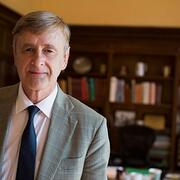
In the 2020 Dean’s Report, I wrote to you all with hope—hope that our community would weather the many storms we faced safely, hope that we would find strength while navigating uncertainty, and hope that we could ground ourselves in compassion even as the world felt unmoored.
I often reflected on these hopes while looking at the renovation of the newly renamed Swartz Hall from my home in Jewett House across the street. The building became a metaphor.
I watched as the planning team paused, adjusted, and reworked the construction schedule to accommodate public health guidance and governmental regulations. Staff from across the School found ways to connect remotely and carry on the thoughtful design, which includes preserving original stone and repurposing those materials in the renovated building. I watched as the roof was carefully restored with slate from a New England quarry and the stained-glass windows delicately replaced using the same techniques glass workers used to create the original windows a hundred years ago.
As the building was restored before my eyes, I could envision the doors opening to our community—offering a much-anticipated moment of reconnection after many dark months of isolation. This century-old structure—steeped in history, now retrofitted with cutting-edge technological and environmental advances—is a testament to honoring the past and embracing the future.
This year has laid bare many intersecting causes of suffering and division. As I reflect on the past, present, and future of the School, the country, and the world, it’s clear we still have a long way to go to get to a place of universal health and equality. As W.H. Auden says in his poem “September 1, 1939”:
Defenceless under the night
Our world in stupor lies;
Yet, dotted everywhere,
Ironic points of light
Flash out wherever the Just
Exchange their messages:
May I, composed like them
Of Eros and of dust,
Beleaguered by the same
Negation and despair,
Show an affirming flame.
Which is to say, the mission of Harvard Divinity School is even more vital, more pressing. Honest inquiry, open minds, and putting the world’s religious resources to work for enlightenment, peace, and justice is at the center of what we do. The world has never needed our affirming flame more than it does today.
Finding Our Way Back
During August 2021, faculty, students, and staff made their way back to Cambridge, judiciously observing the health and safety guidelines so ably set out by Harvard University Health Services and the Provost’s Office—implemented by an exceptional planning team here at HDS. This return to campus was a carefully orchestrated phase-in of in-person teaching and learning. And thanks to the tremendous efforts, stamina, grit, and grace of our community over these long months, we continued our mission of advancing new knowledge and educating students who will make a difference in shaping a better future for all people.
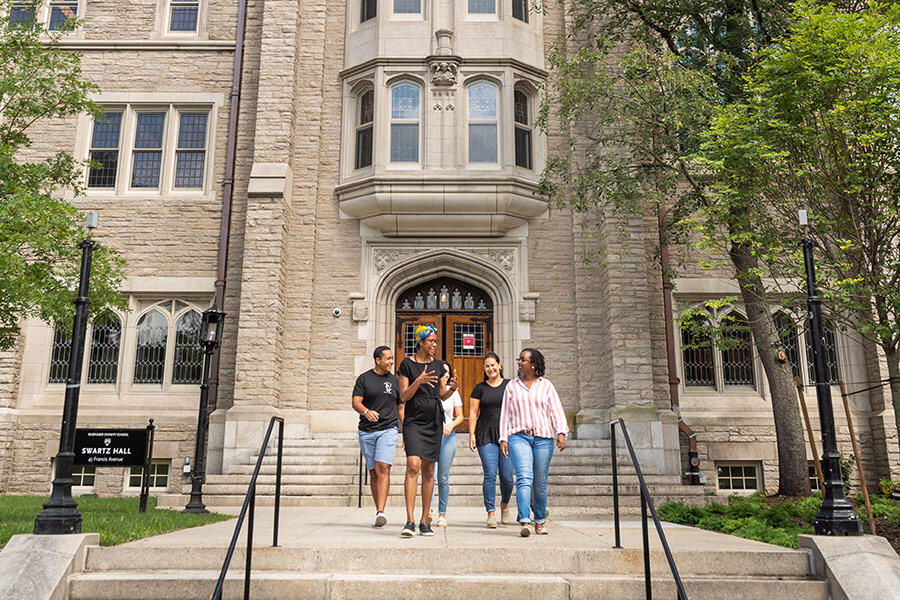
Honoring the Past, Embracing the Future
Welcoming our community back to campus was the recently renovated Swartz Hall, whose two-year transformation was completed in July. Built more than a century ago as Andover Hall, the much-needed renovation was a central goal of our recent capital campaign. None of this would have been possible without support from the donors—especially Susan and Jim Swartz; Ralph and Janice James; Ralph’s sister Cathy James Paglia and their father, Robert James; Chris and Anne Flowers; and anonymous donors who made a classroom naming gift in memory of their dear friend, HBS Professor David Garvin—whose generosity and dedication to the School gave this historic building new life. The support from all those who contribute to the HDS Fund played an important role in this work, as well.
The project team and construction crews, led by our just-retired facilities director, Ralph DeFlorio, carried off an extraordinary project that honored our past while embracing the technological, ecological, and pedagogical priorities of the future. You will find more detail in these pages, but I am especially grateful for the team’s innovative re-use of historical physical materials; to take one example, the new fireplace was built from the same stone blocks removed from the old hall during the transformation. So much has been added, and yet so much has been preserved. I hope all of you will find time in the coming months, as safety allows, to walk through our lovingly restored main doors to tour this magnificent new heart of our campus.
To honor a towering figure in our history, the School also officially renamed Swartz Hall’s historic chapel the Preston N. Williams Chapel. Preston, the first tenured African American faculty member of Harvard Divinity School and the first to lead HDS (or any other Harvard graduate school) when he was acting dean from 1974 to 1975, was also the founding director of Harvard’s W.E.B. DuBois Research Institute. In addition to many other well-earned accolades, Preston was awarded the Harvard Medal by the University in 2021. In further recognition, both Preston and his wife, Connie, have been honored with the Constance W. and Preston N. Williams Scholarship Fund. Preston and Connie have dedicated their lives to working for educational excellence and social justice. This fitting tribute honors both their commitment to community and their dedication to a just and equitable future for all.
Every year brings other transitions. This year we mourned the passing of Constance Buchanan, former director of the Women’s Studies in Religion Program (WSRP), who developed the program into a permanent part of the School and University. A faculty member and associate dean at HDS for 20 years, Connie turned the WSRP into an internationally recognized center for research on the intersections of faith traditions, gender, race, and sexual orientation. The program’s ongoing vitality is her lasting legacy. We owe Ann Braude an ongoing debt of gratitude for leading the next generation of exceptional scholars for the past 20 years (and may she long continue). This year’s cohort is vast and varied in their areas of expertise, as is WSRP tradition. With fellows from the University of Barcelona to the University of Puget Sound, the projects they will be exploring for the year range from interweaving sustainability, spirituality, and Sarvodaya; to studying the female voice in the Qur’an from a gender perspective; to exploring networks of defiance by way of women and heretical conversion in the late Middle Ages. The Women’s Studies in Religion Program continues to connect brilliant minds from around the globe with the HDS community.
Academic Foundations and Innovation
Some 50 years ago, HDS began to transform itself from a largely mainline-Protestant seminary to an institution studying all the world’s great religions (and many smaller ones). As we broadened our vision over the decades, so too have we looked to expand the expertise of our academics into new areas of study and new understandings of the past. This complex process, led by our faculty and students, requires not just a vision of multireligious education but also an expansive, long-term commitment to diversity and inclusion in all forms.
This year brought one of most significant additions to our academic foundations in decades, as the faculty approved the new master of religion and public life (MRPL) degree. The MRPL is a unique, one-year graduate program designed for experienced professionals who wish to develop in-depth knowledge of the ways religion influences public life in their field. The MRPL is an opportunity for practitioners from a range of fields to become leaders who foster a better public understanding of religion and address the most difficult issues of our time.
The new degree fits under the larger Religion and Public Life (RPL) canopy, built upon two key pillars of programming: one to advance knowledge of religion in a wide range of professions, including education, journalism, government, humanitarian action, and media; and a second to support peacebuilding and conflict resolution. RPL seeks to both integrate many of our current programs and build new bridges—all in service of bringing the School’s vast expertise in the study of religion to bear on contemporary challenges. Launched this year, the innovative program and curriculum would not have been possible without the vision of Diane Moore. Thanks to her leadership, the first cohort of MRPL candidates joined us this fall—as diverse and accomplished a group as we could have hoped for when we created the degree.
I am delighted to share that Matthew Potts has been named Plummer Professor of Christian Morals and Pusey Minister in the Memorial Church. In this role, Matt serves as both an educator and a spiritual guide for the University community—and he is supremely qualified in both respects. My heartfelt gratitude goes out to Stephanie Paulsell for serving as interim minister throughout the search and seeing us through two extraordinary years.
We also welcomed the Rev. Teddy Hickman-Maynard as the new associate dean for ministry studies in August. A scholar of social justice, church renewal, and practices of ministry in the Black Church tradition, he joins us from Boston University School of Theology. In addition to his roles as associate dean for student and community life and assistant professor of Black Church studies at BU, he also has more than 20 years of ministry experience, serving in roles that include senior pastor, youth pastor, minister to men, and minister of worship. Currently, he is an associate minister at Bethel AME Church in Lynn, Massachusetts, where his spouse, the Rev. Bernadette Hickman-Maynard, is the pastor. With ministry, academics, and public life serving as the core pillars of an HDS education, we are blessed to have Teddy at the helm of our ministry studies program.
I would be remiss if I didn’t recognize the two exceptional leaders who have guided both our ministry studies and field education programs to their current success. Dudley Rose and Emily Click (our former associate dean of ministry studies, and assistant dean of ministry studies and director of field education, respectively) retired from HDS at the end of June. Dudley had served the School for more than three decades and Emily for 15 years. Their expansive views of ministry and education are largely responsible for the strong programs we have today, and I look forward to seeing many more years of success under Teddy’s leadership.
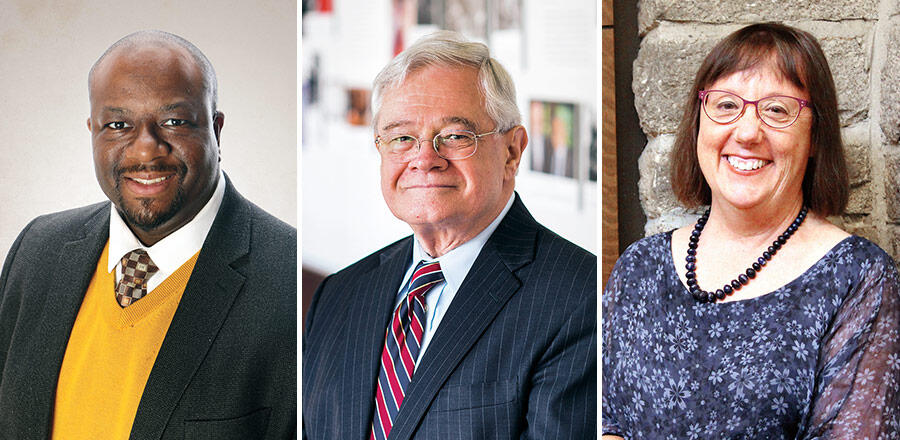
I am also pleased to report one of the oldest scholarly theological journals in the United States has a new editor. Giovanni Bazzana, Harvard Divinity School Professor of New Testament, was named the new editor of Harvard Theological Review on July 1. Founded 113 years ago, HTR has been a central forum for scholars of religion and continues to publish compelling original research that contributes to the understanding and interpretation in the history and philosophy of religious thought in all traditions and time periods. Giovanni stepped into this role following HDS Professors Jon Levenson and Kevin Madigan, who served as co-editors for the last decade. Our many thanks to Jon and Kevin for their thoughtful stewardship of this important forum for intellectual exchange.
This year, we continued to expand our faculty expertise. Teren Sevea was appointed to his new role in July 2020 and is now the Prince Alwaleed Bin Talal Assistant Professor of Islamic Studies, and Mohsen Goudarzi began his appointment as Assistant Professor of Islamic Studies in July 2021. Looking forward to July 2022, we will also welcome two new Professors of New Testament and Early Christianity to HDS: Benjamin Dunning, professor at Fordham University, working in Christian Antiquity, and Annette Yoshiko Reed, professor in the Skirball Department of Hebrew and Judaic Studies and the Program in Religious Studies at New York University. Dunning teaches primarily in the areas of early Christianity, critical theory, and gender and sexuality studies. He earned his PhD in the study of religion from Harvard in 2005. Reed’s research spans Second Temple Judaism, early Christianity, and Jewish/Christian relations in late antiquity, with a special concern for retheorizing religion, identity, and difference. She earned her MTS from the Divinity School in 1999 and her PhD from Princeton University in 2002. As illustrated throughout the 2020–21 faculty search process, their intellectual foci, along with their experience mentoring and supervising doctoral candidates, will be a significant asset for students across Harvard.
Building an Anti-Racist and Anti-Oppressive HDS
Acknowledging the sins of our past is but one step toward a more equitable future. In last year’s letter, I reflected on the need to actively work together in building an anti-racist and anti-oppressive reality for all. This year, Associate Dean Rev. Melissa Wood Bartholomew strengthened this commitment by launching a “Reorientation & Common Read Program” at HDS. Community members studied The Little Book of Race & Restorative Justice: Black Lives, Healing, and US Social Transformation by Fania E. Davis. We held discussions with formerly incarcerated citizens, gave personal witness, and concluded with a discussion led by Dr. Davis herself. These are first steps, “hard/heart” work in Melissa’s words, but they presage the efforts we will undertake throughout the community to reckon with the past and build a better future. In her first year, Melissa has also worked with students, staff, and faculty across the School to center this vital work in a multitude of ways. From moderating conversations on intersectionality and health care with hundreds of participants to providing sound one-to-one guidance, her expertise, care, and concern for the community shines like a beacon here at HDS. I could not be more grateful for her leadership.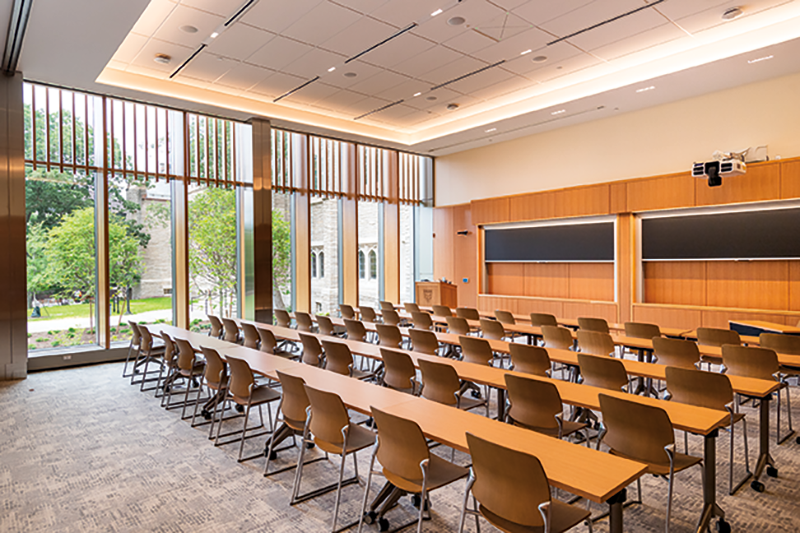
Connections across Harvard and across the Globe
Although the necessary shift to online teaching and learning had its costs, there were unexpected benefits as well. International students unable to move to Cambridge were able to attend classes and pursue their educational goals (some even formed study cohorts in far-flung time zones). Professors were able to host distinguished global scholars in their “classrooms” without the expense, inconvenience, and environmental footprint of travel. HDS also experienced exponential growth in attendance at our online educational, alumni, and cultural events. These phenomena have reshaped our approach to communicating knowledge and learning. By necessity, we were able to expand our community’s reach out to the world and bring the world into our classrooms as never before. The technology advances made available through the Swartz Hall renovation have primed us to reach deeper into these new ways of teaching and learning.
Our international vision was further strengthened this year by the establishment of the Yang Visiting Scholars in World Christianity. This fall, we welcomed the inaugural cohort to campus, joining other visiting scholars from the Hindu Monastics and the Buddhist Ho Family Foundation Visiting Scholars programs. I look forward to all the contributions these interconnected networks of thought leaders will yield to our multireligious community—from thoughtful conversations here at the School to the ripple effects their work will create across the globe.
Closer to home, the year brought many collaborations with other Harvard Schools and institutions. The Center for the Study of World Religions co-hosted numerous pan-Harvard events, such as “Indigenous Women Convening for Peace, Justice, and Reconciliation” to “The New Science of Psychedelics, Ecology, and Spirituality,” and more. Other prominent panel discussions focused on religion and the 2020 election, the Harvard Islam in Africa Initiative, and the Matos Moctezuma Lecture Series. As in every year, there are many experiences in life—many voices once silenced or subjugated—that come into focus through important conversations here at HDS.
Gifford Lectures: Networks, Nodes, and Nuclei
In spring 2021, I had the welcome privilege of taking my first sabbatical in a decade. This sabbatical was dedicated to researching and writing the 2021 Gifford Lectures. Delivered at the University of Edinburgh, the lectures explore religion, science, and philosophy. It’s been a wonderful experience to return to deep research, and I hope to add some understanding to the evolution of Christianity. Titled “Networks, Nodes, and Nuclei in the History of Christianity, c. 1500–2020,” the series proposes that many of the most important changes and developments within Christianity have been transnational in scope, transdenominational in character, and not easily contained within institutional or hierarchical structures. What difference would it make to reimagine the history of Christianity in terms of transnational networks, nodal junction boxes of encounter and transmission, and a greater sense of the core memes and messages of religious traditions and expressions? That is the principal question to be explored in these lectures.
I add another note of deep gratitude. For myself, and all of us in the HDS community, I want to thank David Holland, who served so ably as acting dean during my sabbatical. David’s calm, graceful leadership and thoughtful commitment to the highest standards of educational excellence and diversity guided us through the tumult of those months. His service is another example of all we treasure at Harvard Divinity School.
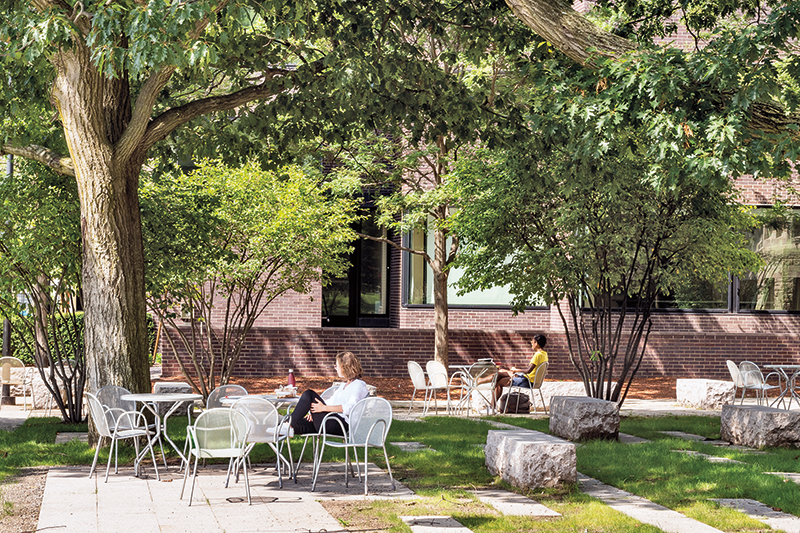
Our Community Endures
Throughout the disruptions of these past months and years, I’ve come to respect even more deeply the lived meaning of community at HDS. In safer and more comfortable times, we’ve perhaps taken too much for granted, believing we can carry ourselves into the future on the basis of history and tradition. All of that changed as the vulnerabilities and injustices of our society—and our imperfect attempts to address them—were once again laid bare. But I emerge from these times more admiring of our strengths and dedication than before. It is to this new work that we now turn, with open minds, resolute hearts, and devotion to our mission in the world.
I have talked quite a bit about gratitude throughout this message, with the intention of acknowledging an appreciation that seemingly surpasses the bounds of language. Even in the midst of compounding challenges, our community found ways to connect, to reflect, and to protect the vision of the Divinity School—providing an intellectual home in service of a just world at peace across religious and cultural divides. As you read through the stories in the following pages, my hope is that you can see the many ways in which your generous offers of time and financial support help make this work possible. With a steadfast commitment to excellence and to each other, we persevere.
From my heart to yours, thank you.
David N. Hempton
Dean of the Faculty of Divinity
Alonzo L. McDonald Family Professor of Evangelical Theological Studies
John Lord O’Brian Professor of Divinity